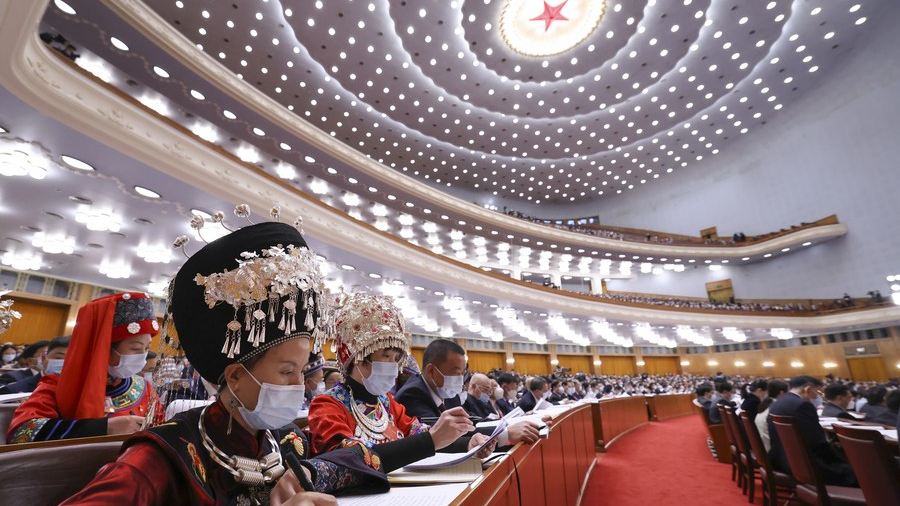
The nightview of Beijing, China. /VCG
The nightview of Beijing, China. /VCG
Editor's note: Daryl Guppy is an international financial technical analysis expert. He has provided weekly Shanghai Index analysis for Chinese mainland media for more than a decade. Guppy appears regularly on CNBC Asia and is known as "The Chart Man". He is a national board member of the Australia China Business Council. The article reflects the author's opinions and not necessarily the views of CGTN.
China's annual Two Sessions includes a government work report delivered by Premier Li Keqiang. It's a lengthy report covering both the achievements of the past year and proposals for the coming year. Investors need to unpack the report from a business perspective because the report foreshadows many investment opportunities.
The most common headline report of the work report in Western media was: "No China infrastructure stimulus as economy stalls to 5.5 percent growth." Those who read no further than the headline miss out on understanding the way the Chinese economy, and business opportunities, are developing.
The structure and focus of the Chinese economy is changing in ways that are designed to avoid the so-called middle income trap. This growth trap is supposed to prevent countries from reaching the standards enjoyed by advanced economies. The work report clearly explained the measures being taken to avoid this middle income trap.
As is often the case, moving beyond the headlines proves a more useful approach to understanding the opportunities. China continues to encourage development of the digital economy. This builds on changes introduced in 2021, including the Data Privacy Protection laws. Investors wait for more details around the digital China initiative which includes building more digital information resources so 5G technology can be applied on a larger scale.
Understanding the Chinese development protocols in this area will allow foreign business to develop and export software and systems solutions that are compatible with this policy focus. Additionally, import opportunities arise from the advances in this area that Premier Li has flagged. This includes the digitization of industries and building smart cities. Chinese leadership in these areas provides opportunities for application in other world cities.

Deputies attend the opening meeting of the fifth session of the 13th National People's Congress (NPC) at the Great Hall of the People in Beijing, China, March 5, 2022. /Xinhua
Deputies attend the opening meeting of the fifth session of the 13th National People's Congress (NPC) at the Great Hall of the People in Beijing, China, March 5, 2022. /Xinhua
Premier Li talked of realizing the potential of data as a factor of production which will further stimulate economic development. The idea of data as a recognized factor of production is new, so investors will watch closely for how this policy translates into real activity.
The work report delivered a rebuke for those who believed the Belt and Road Initiative was dead. Premier Li confirmed that China will continue to promote high-quality cooperation under the Belt and Road Initiative. He spoke of shared growth through consultation and collaboration as the basis of enhancing connectivity.
When this objective is paired with the development of the digital economy it points the way to shared platform development that contributes to cross border transactions and more efficient trade settlement. Software and systems that contribute to this policy objective will be welcomed in an expanding investment environment.
These will become important issues for consideration at Regional Comprehensive Economic Partnership (RCEP) meetings. The adoption of compatible digital standards is an essential component in increasing cross border trade efficiency. Business groups like the Silk Road International Chambers of Commerce have an important role to play in informing members of these standards and developments.
Despite attempts by some countries to constrain China, Premier Li made it very clear that China will make greater use of foreign investment in 2022. This included taking action to ensure a consistent national treatment for all foreign-invested enterprises.
The welcome mat for foreign investment grew larger as he committed to encouraging foreign-invested enterprises to move into a broader range of sectors. This, combined with improving services for promoting foreign investment and accelerating the launching of major foreign-funded projects, suggests a more liberal and supportive environment for foreign business and investment.
For business and investors with a taste for adventure, and who wish to move beyond the ultra-competitive pressures of the Eastern seaboard, the support for foreign investment in the central, western and north-eastern regions signals significant opportunity. Investors will keep an eye open for more details around the implementation of these policy objectives.
The work report sets the policy objectives for 2022. The work report signals investment and business opportunities that show greater depth in the development of China's economy. These are opportunities not to be missed.
(If you want to contribute and have specific expertise, please contact us at opinions@cgtn.com. Follow @thouse_opinions on Twitter to discover the latest commentaries in the CGTN Opinion Section.)

